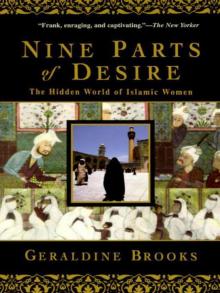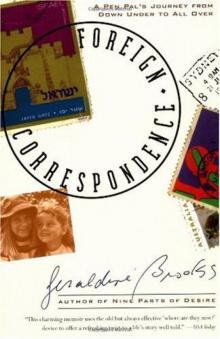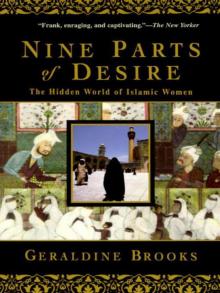- Home
- Geraldine Brooks
Nine Parts of Desire (Korean Edition) Page 12
Nine Parts of Desire (Korean Edition) Read online
Page 12
Every year Mohamed put his name down for the lottery which selected the pilgrims who would make the annual Hajj. The month of Hajj follows immediately after the purifying month of Ramadan. These days, about two million Muslims from all over the world descend on Mecca annually, ritually dressed in simple white garments.
Because the Iranians’ politicized view of religion doesn’t sit well with the Saudis, Saudi Arabia imposes a tight quota on the number of Iranian pilgrims it admits each year. Finally, in 1993, Mohamed’s name was drawn. He planned to take his mother and Janet on the month-long journey. But Janet, after studying the obligations of the pilgrimage, decided not to go. “There is so much more to it than circling the Kaaba and praying for forgiveness on the Plain of Arafat,” she said. Pilgrims not only had to refrain from having sex, she learned. “Even thinking about sex can destroy the value of your Hajj.” As well, there could be no irritable words or malicious thoughts. “I don’t think I’m spiritual enough to do it properly.” Instead, she offered her place to Mohamed’s sister, who delightedly embarked on a special Hajj course of study to prepare herself.
Almost every week of the Mamoudzadehs’ life contained some religious observance bound up in the rituals surrounding births, betrothals, marriages and funerals. During one week-long visit to the family, I learned a lot about Iranian life from two very different deaths.
Mohamed had lost a great-aunt—a ninety-year-old matriarch. Together, we set off for her Shabba Haft—Seventh Night—an evening of ritual grieving that takes place one week after a death. The woman’s children, grandchildren and great-grandchildren were so numerous that the gathering spilled from her own large house into a neighbor’s. Both homes were decked with black crepe, their courtyards filled with carpets and cushions and strung with fluorescent lights. Mohamed parked the car and we split up, he heading with the other men to the neighbor’s house—neighbors generally lend their homes for the men’s gathering, since women often come encumbered with toddlers who might make a mess. Janet and I joined the women and children crowding into the reception room of the dead woman’s home.
Next door, among the men, a mullah read from the Koran, his voice piped through to the women’s gathering via loudspeakers. Mullahs who do such readings are chosen for their fine voices, and after the Koran chant he began to sing a low, mournful song extolling thei rtues of mothers. Around the crowded room, women sobbed gently. Then, with the end of his song, the mood changed abruptly. Servants spread huge sheets of plastic over the carpets and laid out mountainous trays of lamb, chicken, rice and vegetables.
Such gatherings bring families together, but this Shabba Haft also revealed how ten years of war and revolution had torn this Iranian family apart. A picture of the dead woman’s grandson, a “martyr” in the war with Iraq, hung in the center of the living-room wall. Underneath the portrait sat the young man’s sister, who had recently been released from prison after serving a seven-year sentence for shouting “Death to Khomeini.” Her brother, the martyr, had denounced her to the Revolutionary Guards.
“You will find something like this in almost every middle-class Iranian family, if you can get them to talk about it,” Janet said. “The revolution really divided people here—passionate believers and passionate disbelievers all under the same roof.” We were sitting next to the young woman’s aunt. The aunt had lost all three of her own children—two fighting for the regime, the third struggling against it. A daughter died in training for the volunteer women’s militia. At her first practice on the rifle range, she was so startled by the burst of automatic weapons fire that she stood up in her trench and was shot in the head. One son went to the Iran-Iraq front and was listed missing in action. I didn’t tell his mother that I had been to the battle lines where her son had fought. I’d gone from the Iraqi side, since Iran didn’t take women reporters to the front. I arrived the afternoon of a major Iraqi victory, and the Iranian dead lay sprawled and flyblown in their trenches like ragged sacks of rotting meat. The Iraqis had already set to work reinforcing the few meters of desert they’d captured. Giant earth-moving equipment rumbled right over the corpses, leaving the sand smeared with a paste of mashed flesh. There would be no identification for such bodies. Hundreds, maybe thousands of young men will always be “missing” in those sands.
The hardest death had been her second son’s. He had been executed by the Islamic Republic for membership in a militant opposition group named the People’s Mujahedin. He was, she said, a confused young man who had been preyed on by a well-organized group that lived off Iraqi handouts and brainwashed its recruits. I wanted to ask her if she blamed the Iranian government for not showing her son some mercy, but Janet, who was translating, shook her head slightly and didn’t put the question. Instead, I asked gently if she felt that all her sacrifices had been worth it. She nodded without hesitation. “Our village was the first to tear down the Shah’s statue,” she said, “and we haven’t wavered from that path, no matter what you Westerners think.” We talked about her work as a teacher in the village school. After all her losses, she said, she tried now to think of her pupils as her children.
A few days earlier, Janet and Mohamed had attended another Shabba Haft. Unlike the death of the ninety-year-old matriarch, who had gone to her God gently and in good time, this other death had been sudden and shocking.
Annahita was just thirteen years old. In the weeks before her death she had come under enormous pressure from a teacher who was vice-principal of her school. First the teacher had chided her over the way she wore her magneh, telling her the cowl-like hood was pushed too far back, letting her hair spill out provocatively. Another day the teacher took exception to her shoes, saying they were too fashionable for a modest schoolgirl. Then the teacher found a group of girls looking out a particular schoolroom window that had views of an area frequented by young men. Annahita later told her parents that she was sitting nearby, innocently doing her knitting, when the irate teacher pounced on the pupils and marched them all off for a reprimand, then singled her out to stand, humiliated, outside the classroom. It was Ramadan, and Annahita had been fasting, without even a sip of water, since dawn. She stood there, in the hot sun, for the rest of the long schoolday. That evening she confided her misery to an older brother, a medical student. “Every day they harass me. If it’s going to be like this every day I don’t want to go on.” Her brother had no idea how deeply she meant what she said.
At school the next day the vice-principal excoriated Annahita’s mother over her daughter’s behavior. Annahita, the vice-principal said, was well on the way to expulsion. She would, in all probability, grow up to be a whore. Her mother bitterly refuted the teacher’s claims, saying that Annahita hadn’t yet realized there was such a thing as the opposite sex: “She’s still a little girl,” she told the teacher. “I have to hold her on my lap like a baby and force her to have her hair brushed, she’s so uninterested in how she looks.” The argument was still going on when Annahita, distraught, left the school, walked home, climbed to the roof of her house and threw herself off.
A few days later another young girl, also complaining about pressures over hijab and sexuality, killed herself the same way. In her pocket was a picture of Annahita torn from a newspaper account of the earlier suicide. The two cases prompted weeks of soul searching in the Iranian media. “We are sending our kids to school with thousands of hopes for their future,” read the headline on an article about the suicides in a magazine named Today’s Woman. Where, asked the article, are we going so wrong? Like most articles on the subject, this one laid the blame on an overly disciplinarian teacher, calling for more teacher training in child psychology. No one questioned whether the Islamic burden was being laid too soon, and too heavily, on the frail shoulders of little girls.
When I met Janet’s daughter Leila, she had just turned nine, the age when girls assume all the responsibilities of their religion. In Iran, a nine-year-old girl is required to wear full hijab, to rise for dawn prayers and to fast dur
ing the daylight hours of Ramadan. Boys, considered less mature, aren’t required to fast or pray until they turn fifteen. On his return to Iran, Khomeini threw out the Shah’s 1975 Family Protection Law, which had banned child brides and polygamy. Now, in Iran, a nine-year-old girl is legally old enough to marry.
Leila had grown up in Iran but vacationed every other summer with her grandparents in Missouri. In Kansas City she enjoyed the freewheeling games of her American pals. But back home the walls of the courtyard closed in on her. When a car-repair shop opened across the street, she had to put away her bike. “There are always young men there, talking about their cars,” Janet explained. “If she rides around in the street with her brothers, she’ll be stared at.”
The conversion of a house to a mechanic’s shop hadn’t pleased Janet, but she felt powerless to fight it. For one thing, the young proprietor had been a prisoner of war in Iraq and had opened his business on the proceeds of a government grant to help veterans. “And anyway,” Janet sighed, “the local authorities wouldn’t have any sympathy for me saying I wanted my daughter to be free to play outside. In their eyes, she belongs inside, whether there’s an auto shop across the street or not.”
Leila already had her first chador, cut down to size and lace-embroidered on the hem. She loved to wear it. “It makes her feel grown up, I guess,” Janet said. “I suppose I’m lucky that she isn’t rebellious against it.” Janet worried about how her own decision to embrace Islam would ultimately affect her daughter and watched anxiously for signs of a rebellion that would make Leila’s life difficult outside the home.
But, as Leila grew from cute kid to lovely young teenager, religion became one of her favorite school subjects. At prayer time she enjoyed needling her fourteen-year-old brother, who hadn’t yet begun to do his daily prayers.
“Moma, why isn’t Yusef praying?” she would call, loud enough for her brother to hear over the TV show that was engrossing him. “He’s not fifteen, he doesn’t have to,” Janet would sigh wearily. “But, Moma, our teacher says if he knows the prayers and understands them, then he should pray, no matter how old he is, and you know Yusef knows the prayers.”
Janet stopped worrying about rebellion and began to dread the onset of a narrow fanaticism that would raise tensions within the family. Janet had one American friend whose daughter had become so intensely devout that she refused to accompany her mother on visits to the “spiritually polluted” United States.
Leila’s schoolday started with prayers followed by a ritual chant: “Marg bar Amrika [Death to America]!” Her school, the Martyr of Knowledge, was a reasonably progressive institution within the Iranian spectrum and didn’t require its pupils to wear chadors. Chador-wearing for schoolgirls had become controversial following several serious car accidents when drivers at dusk hadn’t seen the black-veiled little figures trying to cross busy streets. Instead, Leila’s school uniform was a dove-gray tunic worn over pants and topped with a magneh. The girls kept their hoods on as they ran and laughed in the playground, even though the school was off limits to all men—even the pupils’ fathers. Pupils passed into the high-walled compound through a curtained entrance zealously guarded by an elderly security man.
Inside, the usual grade school decorations of cut-out animals and nature collections shared space with banners declaring “Death to America.” But the school’s official anti-American fervor was belied by the scramble to get into Janet’s English class. Teaching English fell from favor in government schools during the first decade of the revolution, but after Khomeini’s death it began to creep slowly back. Leila’s school had two English teachers, but it was Janet’s class that was constantly oversubscribed by parents pressing for their children to learn the language with a Midwestern accent.
“This is a pen! This is a desk! I am a girl!” Twenty-three bright little six-year-old faces, framed in their gray magnehs, chanted in unison. One by one, Janet called on the girls to recite the ABC, or to write the unfamiliar Latin alphabet on a board usually covered with the curvaceous script of Farsi. For those who knew their work, the reward was a candy and a round of applause.
Every time I saw Janet she seemed more settled in her community and contented in her private life. So far, Leila has managed to be religiously devoted without drifting into dogmatism. In Iran’s family-centered world, Janet and Mohamed saw more of each other and divided their parenting more equally than most Western couples. The Friday weekend for them was always a family day, spent taking the children to the nearby mountains, to a kebab joint, visiting relatives, or just hanging out at home with the latest videos.
“At first, when my husband brought me here, I hated it,” said one of Janet’s American buddies, stopping in one afternoon for tea. “I just hated every step I took.” The woman had left her husband and gone back to the States. “Back there, I couldn’t believe the rat race. My job demanded every ounce of energy I had. I kept longing for the slow pace of life here, where the home and the family come first, and the job just gets done somehow in between. Then I got cancer, and I felt so alone there. I had relatives, of course, but they couldn’t just drop everything for me. I kept thinking, if I were in Iran the family would drop everything. As soon as I was cured, I came back here, and it really is a good life.”
But tales of domestic contentment didn’t tell the whole story, any more than Betty Mahmoody’s domestic nightmare had. I had lost touch with Janet’s friend Margaret. Two years had slipped by since our first meeting. But one day we made contact again, and she invited me to one of her mother-in-law’s rosees. For devout women, these gatherings—a cross between an afternoon tea party and a religious-studies class—are the major means of socializing.
When I arrived at the house I barely recognized the black-chadored figure who opened the door. Margaret had scrubbed her pale face of makeup and bound her blond hair out of sight. Even her dramatic height seemed shrunken by a weary stoop. As we walked together through her mother-in-law’s courtyard, I admired its centerpiece, a pretty blue-tiled fountain. “My mother-in-law washes there for prayers. It’s my job to scrub it, tile by tile, to make sure it’s puk—religiously clean. I also have to sweep every rug, every day, with that,” she said, pointing to a short-handled bundle of straws. “I’ve got a vacuum cleaner, but I’m not allowed to use it because my mother-in-law isn’t sure it gets the rugs puk. Because I’m a convert, I have to do everything better than a born Muslim just to convince them I’m not still a dirty infidel.” She sounded tired and bitter. All the feisty insolence seemed to have been scrubbed and beaten away with the specks of mold on the blue tiles and the motes of dust in the rugs.
She ushered me into a salon stripped of furniture except for one empty, ornate carved chair, shrouded in black. The other guests—some dozen women—sat on large cushions lining the walls. As the mullah arrived, they pulled the edges of their chadors down over their faces. Without even a greeting, the mullah took his place in the chair and began intoning in a sad, hypnotic voice. Within minutes, most of the women were sobbing. Margaret’s mother-in-law began to keen violently, her shoulders heaving underneath her black chador. From under their veils, women groped blindly for the boxes of Kleenex set out on the floor between them.
The mullah was telling the story of Hussein, the prophet Muhammad’s grandson, leading his army to defeat by treachery on the plains of Karbala, thirteen centuries ago. It is a story every Shiite knows by heart. I was surprised that its retelling could unleash so much emotion. “They are not just weeping for Hussein,” whispered Margaret, sitting on the floor alongside me. “They are weeping for all the terrible things in their own lives—the babies they’ve miscarried, the children who’ve died of disease, the brother killed in the war, the husband who divorced them. In a third-world country like this, women have plenty to cry about.”
The mullah’s singsong voice built to a crescendo, then suddenly ceased. As abruptly as he’d entered, he rose and left the room. The second he was out the door, the women threw off their
chadors. They were dazzlingly dressed in silk suits decked with ropes of pearls and gold. A dozen conversations started up all at once. Margaret immediately jumped up and went to the kitchen, returning again and again with platters of fruit, tiny crisp cucumbers, sweet cakes and tea. The guests primped their elaborate coiffures and wielded tissues on each other’s blurred mascara, then piled the sugar into their tiny tea glasses.
After a while I rose to telephone for a taxi. A few minutes later, when the phone rang, Margaret nudged me and nodded in the direction of her sister-in-law, who was picking up the receiver carefully wrapped in a fold of her chador. “It’s the ‘dirty infidel’ business I was telling you about,” Margaret whispered. “Because you’re not Muslim, she can’t stand to touch something you’ve touched until she’s had a chance to scrub it—or have me scrub it.” In that case, I thought, it was lucky that Margaret’s sister-in-law didn’t know I was Jewish, or she might have felt obliged to throw the phone away altogether. Fear of pollution from Jews is so strong among some Iranians that once, long before the Islamic revolution, the government passed a law requiring Jews to stay indoors during rain or snow showers, lest water that had touched their bodies flow into streams that Muslims might use to wash before prayers.
After Margaret had finished serving everyone, taking directions from the wizened mother-in-law propped up on pillows in the corner, she signaled me to come for a quick private chat in her room.
The “room” turned out to be a narrow alcove, divided from the main salon by a flimsy curtain. She shared the alcove with her son, now almost two. There was no space and little privacy. Her husband had gone on a long business trip to America and, instead of taking her for a visit to her parents, had chosen to leave her behind to do the chores for his mother and sister. “My mom’s not too pleased,” she said. “She calls up and says, ‘You waiting on his relatives again?’ She knows they’re working me to death. She wants me to come home.” Margaret walked with me into the lane behind the house as I waited for my taxi. The neighbor’s kitchens all backed onto the laneway, and the air was rich with the spicy scents of Persian cooking. As my cab made its slow way toward us, I asked why she didn’t take her mother’s advice and go home for a while. She straightened her hunched shoulders and kneaded the small of her back with a clenched fist. “I can’t,” she said. “My husband doesn’t want me to.” It was up to him to sign the papers that would allow her to leave the country. As she waved goodbye, I saw her sister-in-law appear at the door. Margaret’s hands flew to her head, yanking her scarf back over a few stray wisps of blond hair.

 Year of Wonders
Year of Wonders People of the Book
People of the Book The Secret Chord
The Secret Chord Foreign Correspondence
Foreign Correspondence Nine Parts of Desire (Korean Edition)
Nine Parts of Desire (Korean Edition) Caleb's Crossing
Caleb's Crossing The Idea of Home
The Idea of Home Foreign Correspondence: A Pen Pal's Journey
Foreign Correspondence: A Pen Pal's Journey March
March March: a novel
March: a novel The Best American Short Stories® 2011
The Best American Short Stories® 2011 Nine Parts of Desire
Nine Parts of Desire